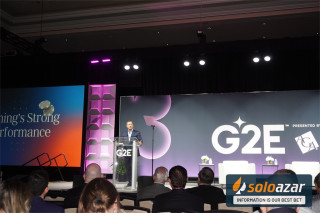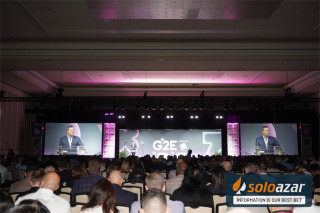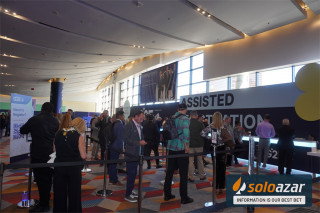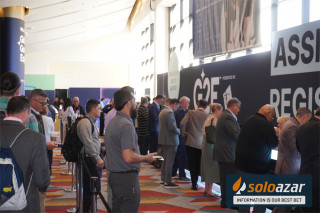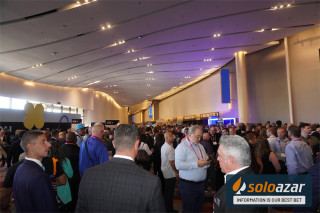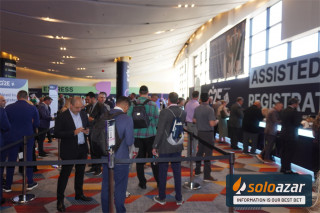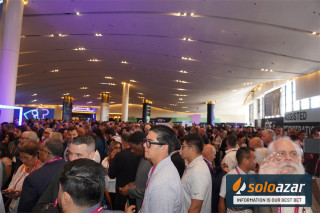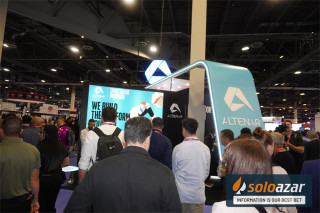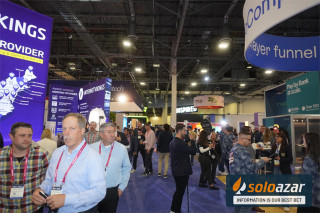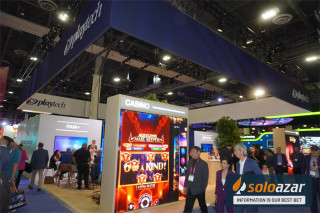Current situation of casino machine imports in Mexico: Analysis from GAT Mexico
2 minutos de lectura
(Cancun, SoloAzar Exclusive) - Gaming & Technology Expo (GAT) made its debut in sunny Cancun, on 26 and 27 November. During the event, Rodrigo Galván, from L&BC Abogados, gave a lecture on the current situation of the importation of casino machines in Mexico. Below are the highlights of his presentation.

Rodrigo Galván began the conference by addressing the ‘controversial issue of the outcome of the regulatory reform that was issued at the end of 2023’.
He explained that the reform ‘generated different prohibitions, as you know, including the approval of section 17bis of article 3 of the regulation that allowed raffles or symbols through machines’. They also strengthened section 12bis, which establishes the prohibition of slot machines. ‘Both prohibitions were made clear in this reform,’ said Galván, supporting the idea of how the regulatory framework evolved to restrict these activities.
Reform challenges: rejections and import delays
After the ban on gaming and raffles, but not explicitly in the area of foreign trade, the main problems arose from the Ministry of Economy towards companies importing casino machines. Galván detailed them as follows:
- Rejections in the automatic notifications: ‘The main problem was the rejections in the automatic notifications of the Ministry of Economy regarding import requests, arguing that the slots did not comply with the new requirements of the aforementioned decree,’ Galván explained.
- Lack of legal clarity: Galván stressed that this lack of clarity is due to the use of the 2023 reform as a justification to deny rights: ‘There is a lack of clarity, in terms of foreign trade, because there is no explicit prohibition, and the authorities have been using the decree, last year's reform, to deny us rights’.
- Administrative silence: Another obstacle pointed out by Galván is administrative silence: ‘In some cases, the authorities have not issued resolutions on requests for automatic import notifications, generating significant delays in the processes. This bureaucratic inaction has hindered the normal development of commercial operations’.
What did the federal judges say about this?
- Interpretation of article 2: The judges determined that ‘article 2, section 2 of the law, by indicating the draws, the number of symbols organised through machines, were understood, let's say, within the concept mentioned therein, of draws, so they are permitted by law’.
- Deadlines for automatic notices: They indicated that the authorities are ‘obliged to resolve, according to the deadlines for automatic notice procedures, which vary between 13 and 15 days for this’.
- Provisional and definitive suspensions: Finally, they stated that ‘provisional suspensions were granted, in some cases, not all, but in some cases provisional and definitive suspensions were granted, granting this measure against these articles of regulation, allowing the companies to operate and import the machines while the matter was being resolved’.

What were the effects of these challenges?
Favourable results
Rodrigo Galván explained that favourable rulings were decreed, highlighting that ‘favourable results were decreed, the unconstitutionality in the first instance rulings, in general terms, and some second degree rulings already obtained, where the unconstitutionality of the prohibition of sweepstakes through machines was decreed, as well as the preceding articles already mentioned’.
Unfavourable results
However, not all cases were successful. According to Galván, ‘there were those who did not meet the same fate, and basically the analysis made by the judges in those cases was to determine that the complainants had not accredited the legal interest, evidencing a direct and real affectation of their interests’. In addition, he noted that ‘the judges also considered the risk of unlawful use of the machines as part of the public order of social interest, which is considered a risk factor in the judges’ consideration’.
CEVO guidelines for importation
Galván explained that in August this year, CEVO guidelines emerged that seek to regularise and facilitate the importation of machines, indicating that ‘these guidelines refer only to commission agents and operators to legally access the machine’. He added that ‘the aim is to guarantee legality and control, emphasising that those who have the appropriate permit can operate them’.
Import requirements
Regarding the requirements, he stated that ‘it was established that the procedure must be carried out through the automatic notices of the Ministry of Economy, which are written and free of charge’. In addition, he mentioned that ‘a series of documents are requested, such as the details of the permit, justifying why the machines are going to be imported, listing the machines to be imported, and accompanying invoices, mortgages, contracts with suppliers’.
Galván insisted that ‘these guidelines are a little contradictory in relation to what the reform established regarding prohibitions, but they could be used favourably in legal proceedings, if they are brought by private individuals, knowing how to take advantage of them’.
Brief summary of the import procedure
1. In the first phase, the dossier is drawn up.
2. In the second phase, the documentation is reviewed and validated.
3. In the third phase, the import payment is reported and captured. Galván explains that the wage classification is carried out, which ‘by the way, has not undergone any changes or major restrictions’. As mentioned, ‘there has been no express prohibition on foreign trade’.
4. In the fourth phase, the machines are cleared for delivery to the importer.
Recommendations for importation
- First review of the automatic notices: it takes 13 to 15 days, and the judges obliged the authority to issue a response within that time.
- Customs procedure: which includes the preparation and delivery of documents, takes 2 to 3 working days.
Inspection: is random and, depending on the type of access, can take between 1 and 4 working days. - Total estimated processing time: 16 to 22 working days, provided the documentation is correct and there are no obstacles.
Final considerations
According to Rodrigo Galván, success in importing and in lawsuits depends on having all the documents for the process, such as ‘the notices we have already mentioned, import, permits, invoice, list of packages, import method, receipts, among others’.
As for the legal approach, Galván stresses that it is necessary to ‘design a sufficiently solid legal strategy’ to demonstrate that, despite not fully complying with the regulation, the supplier does suffer a real affectation, based on its ‘corporate purpose authorised in its statutes’.
Categoría:Events
Tags: GAT EXPO Gaming & Technology,
País: Mexico
Región: Central America and Caribbean
Event
G2E - Las Vegas 2025
06 de October 2025
CT Interactive on Innovation, Networking, and Market Growth at G2E 2025
(Las Vegas, SoloAzar Exclusive).- The global gaming industry marked G2E’s 25th anniversary with a major gathering in Las Vegas. CT Interactive stood out for its innovative product development and international growth strategy. Account Manager LATAM at CT Interactive, Roberto Muñoz, shared insights on G2E’s importance, emerging trends, and the company’s collaborative expansion efforts.
Thursday 30 Oct 2025 / 12:00
Atlaslive Explored the Future of Gaming in Latin America at Recent G2E 2025
(Las Vegas, SoloAzar Exclusive).- Bruno Almeida, Head of Sales LATAM at Atlaslive, attended G2E for the first time to explore how land-based and online gaming are converging. His experience highlighted key trends shaping the Latin American market, from immersive casino innovations to strategic networking and regulatory insights.
Monday 27 Oct 2025 / 12:00
G2E 2025: Cristian Galarza, ASAP Director Explains the Importance of Attending the Event
(Las Vegas, SoloAzar Exclusive). - After attending the 25th anniversary edition of G2E in Las Vegas, ASAP’s director shares his perspective on the evolution of the industry, driven by digitalization, efficiency, and the creation of international networks that foster new business opportunities.
Tuesday 28 Oct 2025 / 12:00
SUSCRIBIRSE
Para suscribirse a nuestro newsletter, complete sus datos
Reciba todo el contenido más reciente en su correo electrónico varias veces al mes.


















